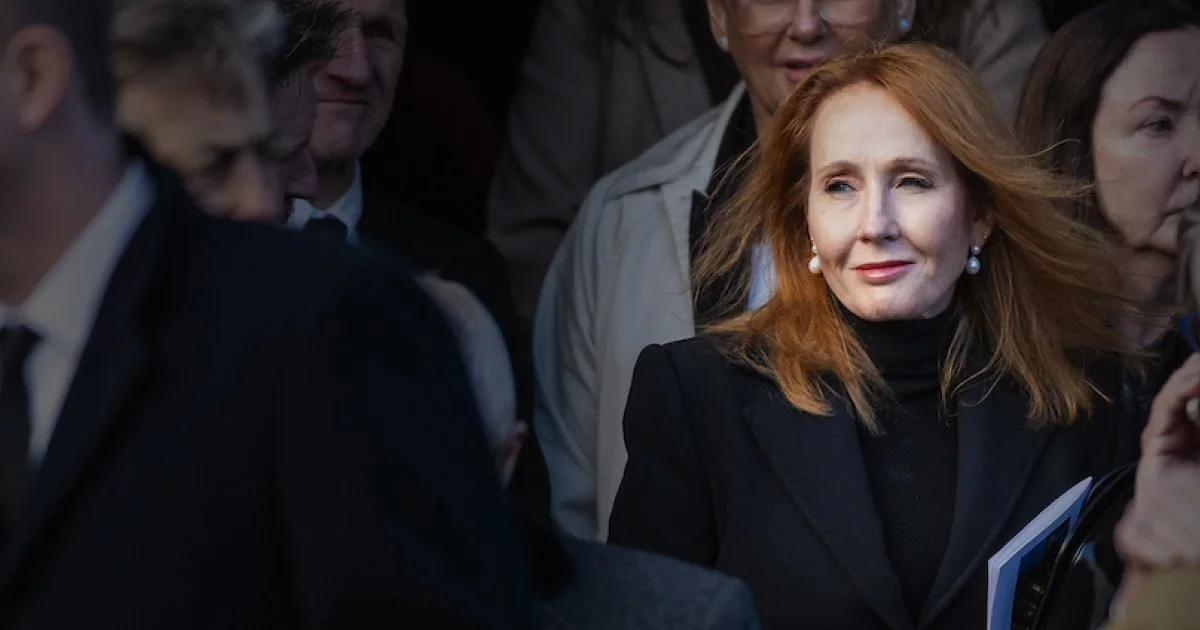A Christian defence of JK Rowling
Samantha Smith• August 6, 2025
There is something curiously medieval about the modern inquisition against JK Rowling.
An author once lauded for her imaginative portrayal of witches, warlocks and a magical world beyond the comprehension of “muggle” society, now she stands defiantly at the stake of popular culture, unburned despite the furious flames lapping all around her.
If she had tried to release Harry Potter and the Philosopher’s Stone today, she might well not have made it past the publisher: a white, cisgender woman writing about bravery, injustice and a world where good and evil actually held meaning? Not exactly in vogue.
Even the eponymous hero of the series would be decried as a symbol of right-wing toxic masculinity. Why? Because Harry Potter is an impoverished white English boy, of course!
The irony is palpable. A lifelong progressive, JK Rowling has now been cast out from the annals of progressivism by the same picket-wielding activists who probably would have protested the Salem Witch Trials. Instead of pitchforks and nooses, today their weapons of choice are hashtags and cancellations.
A woman, once celebrated for imagining a world of mystique and moral clarity, has been branded a heretic by the high priests of gender politics. Her crime? Defending the rights and protections owed to biological women.
As a Christian, I find it baffling that those who claim to stand against oppression are so swift to denounce the very concept of freedom and truth itself. It is precisely because I believe in truth (and nuanced debate) that I offer a Christian defence of Ms Rowling.
Biological sex exists. That is an irrefutable fact. And women deserve dignity, language and spaces that reflect that fact. She didn’t call for hatred. She didn’t dehumanise anyone. She simply refused to participate in the metaphysical gymnastics required to pretend that sex is a feeling instead of a fact.
Indeed, in her initial published comments on the transgender debate, JK barely even referenced the transgender community, let alone called for their eradication. Despite what has developed as the airtight lore of the JK Rowling transphobia tale, the internet cabal got it wrong.
What she did do – calmly, clearly and without malice – was express concern over the erasure of language around biological sex, and about the implications this might have for women’s rights, particularly for vulnerable women in single-sex spaces.
There was no slur, no smear, no sweeping condemnation: just a series of reasoned arguments and personal reflections, including her own experience as a survivor of abuse and her decades of expertise leading women-focused charities like Lumos and Beira’s Place.
But that didn’t matter. In the eyes of the Internet’s outrage machine, Rowling had been vilified as if she were Voldemort himself.
For any Christian, it is deeply troubling to see such deliberate muddying of fact and fiction. The same progressives who claim to stand against oppression are now enforcing a new orthodoxy – one which denies freedom of conscience, penalises dissent and crucifies those who dare to speak what was (until recently) basic common sense.
It is not “acceptance” that incenses these mobs, but a dogmatic determination to redefine reality. A new dialogue was cobbled together from inferences and omissions – one befitting the antagonist they wanted her to be.
Now, Rowling is no saint. She has not always shown the humility or consistency one might hope for in a moral campaigner. But this is not about canonising her. It is about the vital message she shares: biological sex does matter and is not only scientifically valid, but morally necessary.
Genesis tells us: “male and female; He created them.” This isn’t a call to rigid social roles, but a recognition that our bodies are not accidents of biology, but gifts imbued with meaning. The freedom of man – or woman – to act outside of narrow cultural conventions is not a new concept.
Christianity has never required a uniform expression of gender. From Joan of Arc in armour to Renaissance men in lace, expressions of gender variance have always been part of the human experience. This kind of self-expression is not sinful; it can be richly human, even beautiful.
However, the proposal that feelings nullify scientific fact is rather more extreme. The existence of biological sex does not remove the civil rights of any person to dress, behave, or exist as they wish.
Defending the sanctity of women’s spaces – whether in prisons, shelters, changing rooms or sports – is not a rejection of transgender people’s humanity. It is a refusal to let a political ideology dismantle the hard-won protections of another group.
A society that cannot distinguish between compassion and capitulation has lost its moral compass. And Rowling’s refusal to recant has become something rare and admirable: a public stand for moral integrity.
Christians should be the first to say that every person bears the image of God. But recognising someone’s worth doesn’t mean agreeing with everything they believe about themselves.
Love doesn’t equal dishonesty, nor does it require you to sacrifice your own knowledge at the altar of affirmation. Our bodies are not valueless flesh-suits to be escaped or subverted: they are part of God’s divine intention, not an obstacle to it.
That’s why Rowling’s stance, though secular, mirrors a duty that all Christians should recognise: to tell the truth, even when the world demands a lie. And while she may not quote Scripture, she lives like someone who understands the cost of standing up for the silenced.
For all her faults, Rowling is standing her ground. In our modern, morally grey world, we should be grateful for those who are willing to stick their heads above the parapets (and pay the price for it).
Better to be cancelled for speaking the truth than praised for saying nothing at all.
Photo: graphic featuring JK Rowling (credit: Arcadia).

